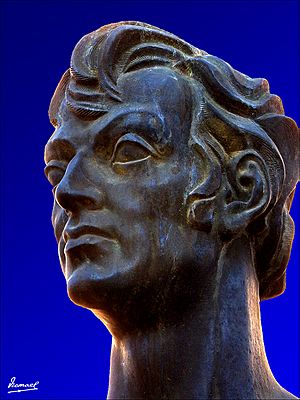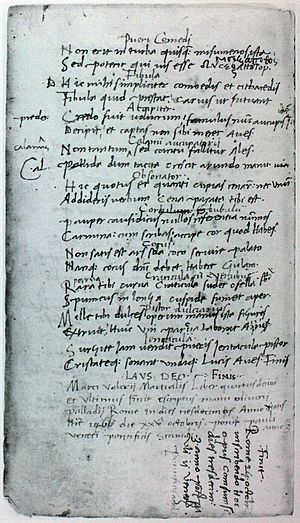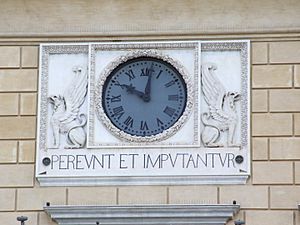Martial facts for kids
Quick facts for kids
Martial
|
|
|---|---|

Bust by Miguel Melero
|
|
| Born | March, between 38 and 41 AD Augusta Bilbilis, Hispania Tarraconensis, Roman Empire (in modern Aragon, Spain) |
| Died | Between 102 and 104 AD (age about 64) Augusta Bilbilis, Hispania Tarraconensis, Roman Empire |
| Occupation | Author |
| Nationality | Roman |
| Genre | Satire |
| Notable works | Epigrams |
Marcus Valerius Martialis (known as Martial in English) was a famous Roman poet. He was born in what is now Spain between 38 and 41 AD. Martial is best known for his twelve books of Epigrams, which are short, clever poems. He published these poems in Rome between 86 and 103 AD, during the time of emperors Domitian, Nerva, and Trajan.
In his poems, Martial often made fun of city life and the silly things people did. He also wrote about his love for his home in the countryside. He wrote 1,561 epigrams in total. Many people consider Martial the greatest writer of epigrams from ancient Rome. He is even seen as the person who created the modern style of epigram.
Contents
Martial's Early Life
Most of what we know about Martial's early life comes from his own writings. He mentioned celebrating his 57th birthday in one of his poems, which helps us guess he was born around 38 to 41 AD. This was during the rule of emperors Caligula or Claudius.
Martial was born in a place called Augusta Bilbilis, which is now Calatayud in Spain. His parents, Fronto and Flaccilla, likely passed away when he was young. Even though his name sounds Roman, he said he came from the "Celts and Iberians" and was a "countryman of the Tagus River." He also mentioned his "stiff Hispanic hair," showing pride in his Spanish background.
His childhood home was comfortable and had plenty of food. It was in the countryside, so he enjoyed hunting and fishing. He often remembered these fun times in his poems. He also had many friends there. These memories of his simple, happy early life helped him stay positive while living in busy Rome.
Martial went to school in Hispania. This part of the Roman Empire produced many great Latin writers in the 1st century, like Seneca the Younger and Quintilian. Martial said he was inspired by poets like Catullus. His amazing skill with words helped shape the epigram style we still see today.
Life in Rome as a Poet
After finishing his education, Martial moved to Rome in 64 AD. He might have been encouraged by famous writers like Seneca the Younger and Lucan, but we don't know for sure.
The first 20 years he spent in Rome are a bit of a mystery. He wrote some poems when he was young, but he didn't think much of them later. He joked about a bookseller who wouldn't let these early poems disappear. Martial's writing got better as he gained more experience and learned about Roman society. Many of his best poems were written in his later years.
His friends, including Quintilian, encouraged him to become a lawyer. But Martial preferred his own relaxed, "Bohemian" lifestyle. He made many powerful friends and supporters, including emperors Titus and Domitian. They gave him special benefits, like the semestris tribunatus, which gave him the rank of a Roman knight. Martial even helped many people become Roman citizens by asking the emperor.
His first important work, Liber spectaculorum, was published for the opening of the Colosseum during Titus's rule. This book was about the shows held there. He published two more books, Xenia and Apophoreta, in 84 AD. These books contained short poems for gifts. In 86 AD, he started publishing the twelve books that made him famous.
From 86 AD until he returned to Spain in 98 AD, Martial published a new book almost every year. The first nine books came out during Domitian's reign. Book XI came out after Nerva became emperor. A new version of Book X was published around the time Trajan came to Rome. His last book was written after he had been back in Spain for three years, shortly before he passed away around 102 or 103 AD.
These twelve books show us what Martial's life was like between the ages of 45 and 60. For 35 years, his main home was busy Rome. He first lived on the third floor of a building. He also had a small country house near Nomentum, where he sometimes went to escape the city's noise and problems. Later, he also had a small house on the Quirinal Hill.
At one point, he left Rome for a short time because he was tired of trying to get attention from important people. He thought about moving to a new area, but Rome had a strong hold on him. Even the poems he sent from other places still sounded like they were written in Rome, talking about its streets, baths, and markets.
Martial finally left Rome because he was tired of the social demands and the cost of living in the big city. He looked forward to returning to his childhood home. He wrote a famous poem to Juvenal that showed he was happy there for a while. However, a letter he wrote later shows he missed the literary and social life of Rome. The only comfort in his "exile" was a lady named Marcella, who seemed to be his supporter. Martial always needed someone to support him.
While in Rome, Martial knew many writers. Besides Lucan and Quintilian, he was friends with Silius Italicus, Juvenal, and Pliny the Younger. Interestingly, Martial and another poet named Statius didn't write much about each other, perhaps because they didn't like each other. Martial often showed he didn't care for the long, serious poems Statius was known for.
Martial and His Supporters
Martial depended on his rich friends and supporters, called "patrons," for money, food, and even clothes. In ancient Rome, it was considered normal and honorable for a writer or artist to have a patron. Famous poets like Virgil and Horace also received gifts from emperors like Augustus and important people like Maecenas.
However, the relationship between a client (like Martial) and a patron changed over time. By Martial's era, even well-born and educated people would accept daily handouts. Martial was just following a common practice by trying to get favors from important people. Early in his career, he would go with his patrons to their country homes and visit them in the mornings. Later, he would stay at his own small country house and send a poem or a book of poems instead of visiting in person.
Martial's Personality
Pliny the Younger, another famous writer, said about Martial: "He had as much good-nature as wit and sharpness in his writings." Martial claimed he didn't attack specific people in his poems. He seemed to admire honesty and sincerity in his friends.
Some people might find it strange that Martial seemed to flatter some of Rome's bad emperors. However, he often criticized them after they died. He seemed to dislike people who pretended to be something they weren't. He was also free from showing off or being overly formal.
Even though some of his poems showed a cynical view of women, others proved he could respect and admire kind and polite ladies. His life in Rome didn't show him much family life, but his poems show that even in his time, people knew that being good was the best way to be happy. Martial also showed great affection for children and the people who worked for him.
Martial's Epigrams

Martial's poems, called epigrams, show how curious he was and how well he observed the world around him. His epigrams are interesting not just because they are well-written, but also because they give us a colorful look at daily life in ancient Rome. He was very familiar with the sights and sounds of the city.
For example, Martial gives us a peek into what living in Rome was like:
I live in a little cell, with a window that won't even close,
In which Boreas himself would not want to live.
Fires were a big problem in ancient cities because many buildings were made of wood. People often used open fires and oil lamps, which could easily cause a blaze. Martial even suggested that some people might have set fire to their own homes on purpose to get money, like this example:
Tongilianus, you paid two hundred for your house;
An accident too common in this city destroyed it.
You collected ten times more. Doesn't it seem, I pray,
That you set fire to your own house, Tongilianus?
Martial also made fun of the doctors of his time:
I felt a little ill and called Dr. Symmachus.
Well, you came, Symmachus, but you brought 100 medical students with you.
One hundred ice-cold hands poked and jabbed me.
I didn't have a fever, Symmachus, when I called you–but now I do.
Martial's epigrams also show the harsh treatment of enslaved people in Roman society. Below, he scolds a man named Rufus for punishing his cook for a small mistake:
You say that the hare isn't cooked, and ask for the whip;
Rufus, you prefer to carve up your cook than your hare.
Martial's epigrams are also known for their sharp and often insulting humor. This has earned him a place in history as one of the first "insult comics." Here are some examples of his witty, critical work:
You feign youth, Laetinus, with your dyed hair
So suddenly you are a raven, but just now you were a swan.
You do not deceive everyone. Proserpina knows you are grey-haired;
She will remove the mask from your head.

'You are a frank man', you are always telling me, Cerylus.
Anyone who speaks against you, Cerylus, is a frank man.
See also
 In Spanish: Marcial para niños
In Spanish: Marcial para niños
 | Shirley Ann Jackson |
 | Garett Morgan |
 | J. Ernest Wilkins Jr. |
 | Elijah McCoy |

